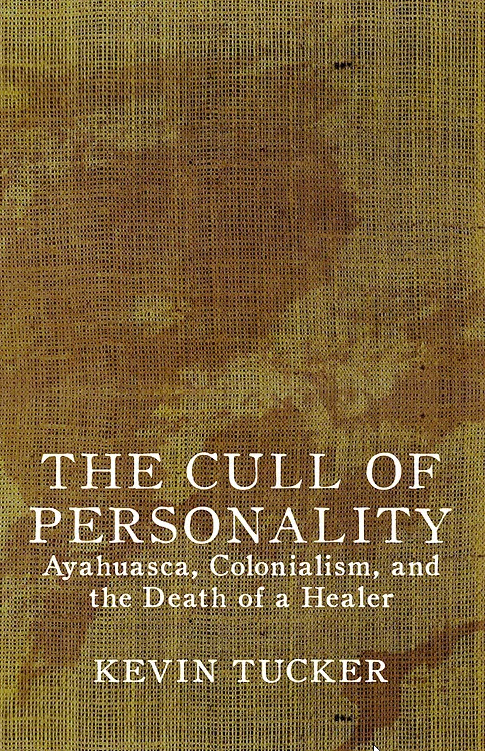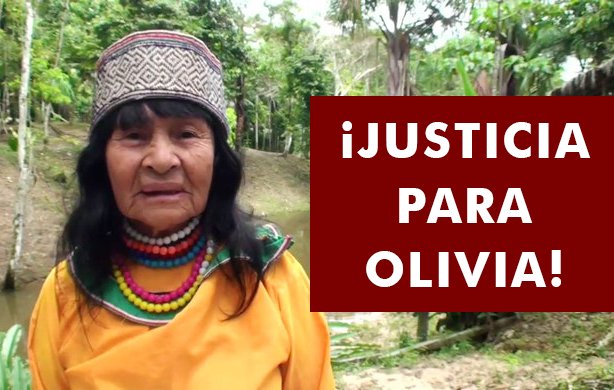A year ago, a video spread online where the Canadian Sebastian Woodroffe was lynched and killed by indigenous people in the Peruvian Amazon. He had previously shot dead the 81-year-old environmental activist and medicine woman Olivia Arévalo, after she denied him ayahuasca.

Olivia Arévalo was a Healer and not a Shaman, Kevin Tucker explains. The latter is a colonial construction, and that is very important to the context. Throughout her whole life, Olivia Arévalo had defended her culture and nature’s rights, while trying to survive in a post- and neocolonial world where knowledge such as hers, about medicinal plants and healing, became more and more sought after, mythified and commodified by the outside world.
She said no, and he killed her.
It is in this true story, that should not be seen as an isolated event but a continuation of the colonialism and exploitation of indigenous peoples, as Kevin Tucker’s latest book The Cull of Personality – Ayahuasca, Colonialism, and the Death of a Healer, argues.
Sebastian Woodroffe was a modern Pizarro who, with crowfunding through the site Indiegogo, had traveled to Peru to extract original knowledge and customs on the psychedelic brew ayahuasca. His goal was to sell hallucinogens and traditional references as a therapist, a drug and addiction therapist, at home in Canada. It was certainly a profitable career plan. Ayahuasca is believed to cure everything from PTSD and depression to addiction. And in Canada, as well as everywhere, mental illness and addictions are an escalating societal problem.
Let us rewind: she said no, he shot her dead.
According to the Amazon indigenous peoples, Woodroffe was one of many disrespectful gringos who had been harassing and pressing Olivia Arévalo, also called “grandmother” within the tribe, for a long time. Villagers had also tried to get help from the police to defend themselves against his harassment, but this proved ineffective.
This was the lead-up an event that would bring down condemnation raining down from the outside world, accusing the indigenous people of committing a horrific crime, and embodying what Kevin Tucker criticizes; the colonial narrative where the white man’s “innocence” and “good intentions” are always set against the indigenous people who are deprived of all honor, all legacy, no matter what the white man might do. Even if the white man murdered ”grandmother.”
Killing indigenous people is, on the other hand, ignored everyday.
The predominant story, the entire colonization, has been criticized before. Not at least in the writer Eduardo Galleano’s tradition. However, Kevin Tucker’s analysis differs from earlier ones by not only acknowledging the absolute preference of indigenous peoples, but also recognizing their versions and acts without any reservation. We can say what ever we want about leftist analysis and socialist projects, but they have not been critical of civilization in the colonial context and many have treated indigenous peoples, especially nomadic and semi-nomadic peoples, with a fatal paternalism very similar to that of the missionaries.
Indigenous peoples are exterminated, everywhere. They must all be domesticated in order to even begin to relate to power in order to fight for their rights to exist. This is the golden rule of civilization, Tucker argues. It both starts and end with this.
Yet It does not start nor end with this. Tucker, a stylistic experimenter, explores how the power orders of civilization converge, layer upon layer, from the beginnings of oppression up to contemporary global civilization with its final alienation; the total illusion of individualization and the lost context of life. The vanished meaning of everything of value.
Everything lacks meaning without context, life requires culture. And that was exactly what Woodroffe tried to steal from the indigenous peoples, Tucker argues, an act of cultural appropriation if ever there was one. But, as Tucker also says, Woodroffe’s personal motives are uninteresting. It changes nothing if his actions were grounded in greed, cynicism, madness, banal evil or naive belief that a hallucinogenic substance, cut off from its context, would be of use to anyone.
His killing of Olivia Arévalo, and all his actions before, were anyway part of the perpetual colonialization of the Amazon, where Big Oil and Big Pharma’s biopirates are pushing their agenda forward side by side with individuals who psychologically are little different from Pizarro. His predatory operations were manifested in a growing spiritual tourism industry where people, instead of oil and gold, regularly and literally turn bodies into compost in order to find their Oneness, or to sell it to desperate souls seeking a cure for addiction, mental illness, or just modern boredom.
The hunt for ayahuasca is not about ayahuasca, Tucker points out, but is just one of many late-modern expressions of a mentality, an idea world, where all people and other animals, cultures and nature, are there to exploit. The red thread is visible to everyone, from Pizarro to Woodroffe: she said no, it should have been enough.
With this poetically written and historically staggering book, Kevin Tucker has succeeded in highlighting the links between different power systems that obliterate social and ecological contexts in which we have a chance to survive. I would have liked a deeper discussion of several of the book’s parallel tracks, for example regarding the nomads’ mobility and the resilience of cultures, in this era of the global collapse. But that is perhaps a misguided criticism of a work that otherwise manages to articulate such a broad discussion of our basic living conditions and applies a critique of civilization that few dare to apply, even though the mega machine should exterminate life on the entire planet.
Olivia Arévalo is dead, and the earth is dying. She was right, he had nothing to do there.
And, as regards psychedelic drugs, if you ever think of going to a retreat which promises exclusive meetings with god on a yoga mat in a rush of ayahuasca, read this book first. Or, if you meet someone who believes that a hallucinogenic substance can fix their own or the world’s problems, recommend this book.
The Cull of Personality – Ayahuasca, Colonialism, and the Death of a Healer, by Kevin Tucker, is published by Black & Green Press, 2019
Nette Wermeld Enström is an Ethnographic Researcher and Writer from North Sweden, formerly based in the Ecuadorian Amazon as researcher and investigative reporter for SwedWatch and Corpwatch. She is author of A Swedish tiger/A Swede stays silent – about Skanska, oil, and destruction in the Amazon (Notis förlag, 2010, and from
http://www.ageradistribution.net/agera/sv/klimat-miljo/642-en-svensk-tiger-om-skanska-olja-och-forintelse-i-amazonas.html), and the Reseacher to the SwedWatch Report Progress on Whose terms? (2008) in cooperation with Political Scientist Hanna Dahlström.


